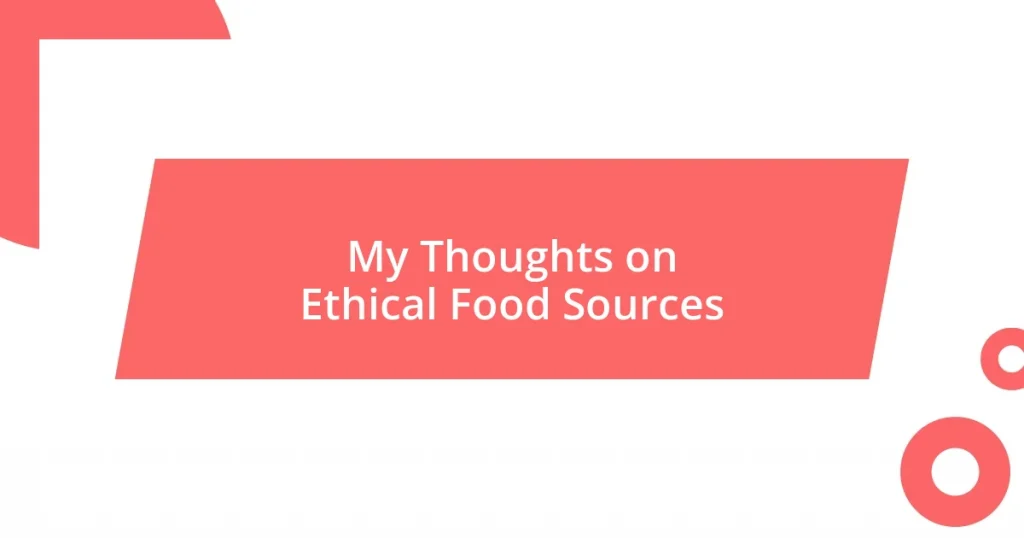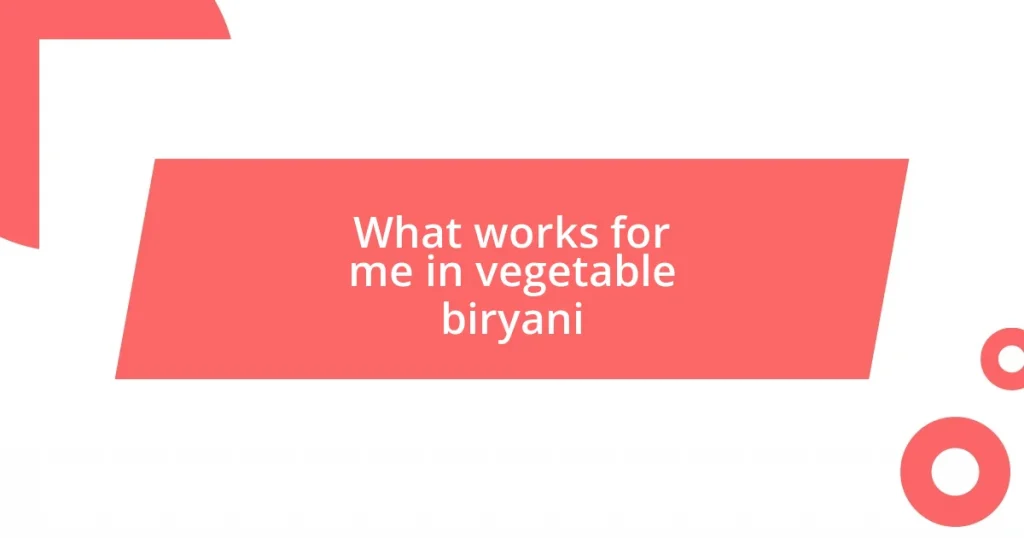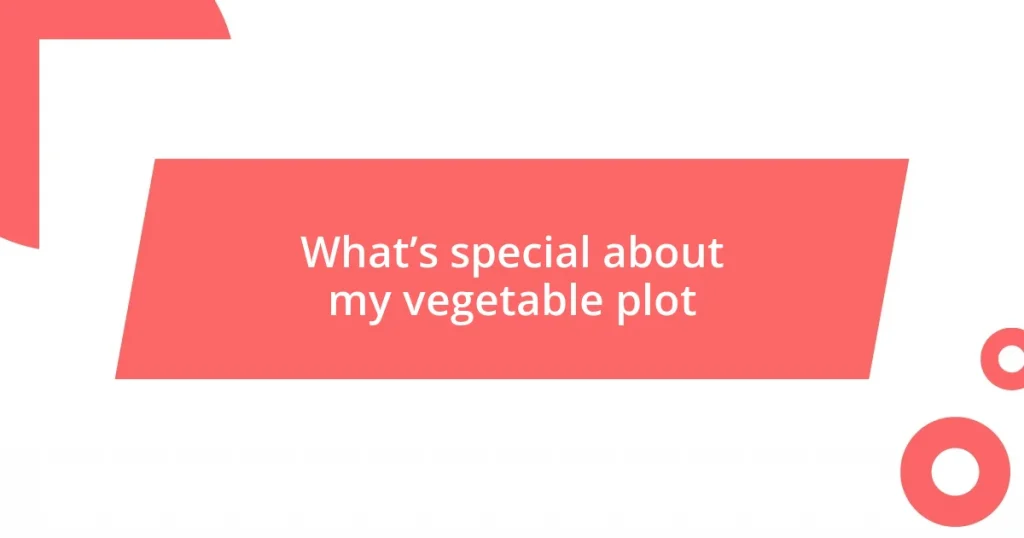Key takeaways:
- Understanding ethical food sources emphasizes transparency, sustainability, and humane treatment, fostering a deeper connection to food and the community.
- Sustainable practices are essential for environmental conservation, supporting local economies, and promoting biodiversity, which contribute to a healthier planet.
- Incorporating plant-based options and building sustainable meal plans enhance health while reducing environmental footprints, making mindful eating both enriching and satisfying.
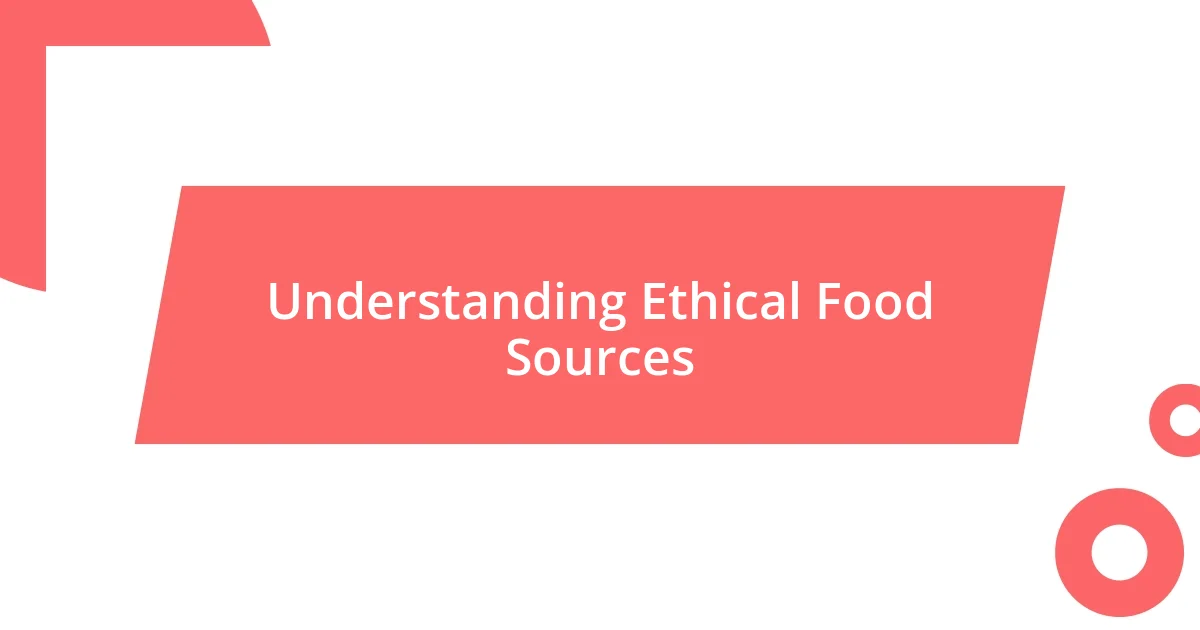
Understanding Ethical Food Sources
When I first began exploring ethical food sources, I felt a genuine curiosity about where my food was coming from. Have you ever wondered about the story behind the meals on your plate? Ethical food sources emphasize transparency, sustainability, and humane treatment of animals, challenging us to consider not only our health but the well-being of the planet and its inhabitants.
Ethical food sourcing can look different for everyone. For instance, I vividly remember visiting a local farm and seeing how they raised animals in a free-range environment. It was such a stark contrast to commercial farming practices I’d learned about. This experience made me realize that choosing ethical sources is about making conscious decisions, a way to align our eating habits with our values.
Moreover, it’s not just about the food itself; it’s the community and the relationships behind it. I often engage with local farmers at markets, and there’s something heartwarming about sharing stories and resources. Isn’t it refreshing to support people who are genuinely passionate about their craft? Understanding ethical food sources brings about a deeper connection—not just to the food, but to the world around us.
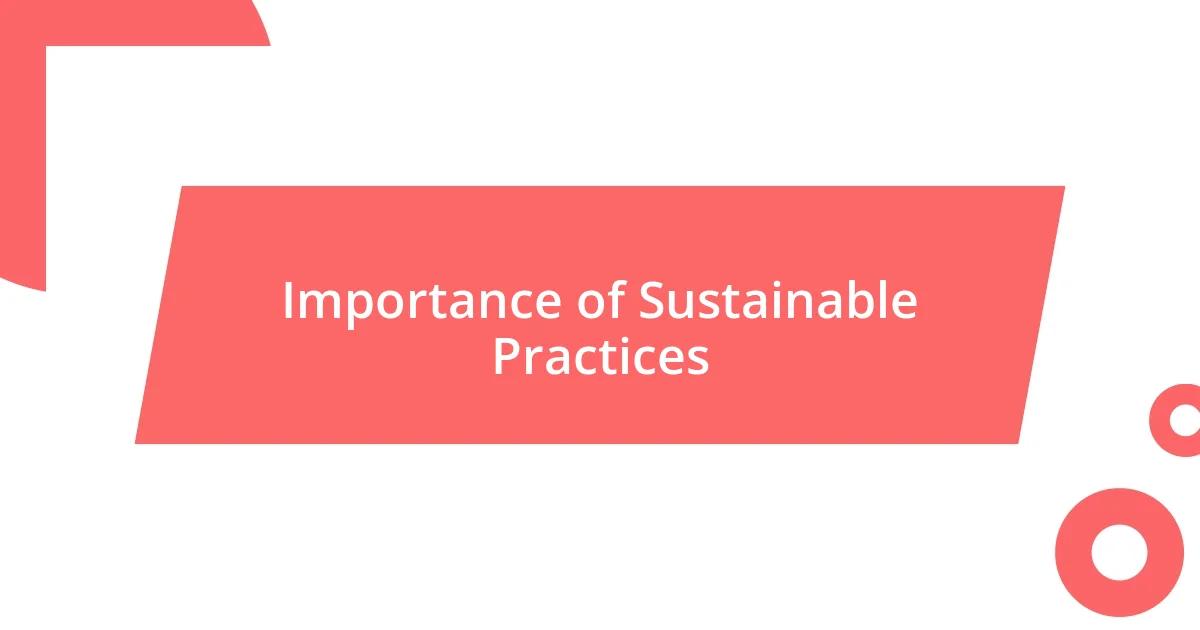
Importance of Sustainable Practices
Sustainable practices are crucial for preserving our planet for future generations. Each time I engage with local farmers or visit community-supported agriculture (CSA) programs, I’m reminded of how vital these practices are. It’s not just about reducing our carbon footprint; it’s about nurturing the land and our communities. When we choose sustainable foods, we’re actively participating in a system that values environmental stewardship and social responsibility.
Here are some essential reasons why sustainable practices are important:
- Conservation of Resources: Sustainable farming helps conserve water and soil health, ensuring these vital resources remain abundant.
- Biodiversity: By supporting diverse agricultural practices, we protect various species and promote a balanced ecosystem.
- Climate Resilience: Sustainable practices contribute to climate change mitigation by reducing greenhouse gas emissions.
- Local Economies: Supporting local farms boosts economies and strengthens community ties, reinforcing a sense of belonging.
- Quality of Life: Choosing sustainable foods often means better nutrition and health benefits for consumers and workers alike.
I remember a time visiting an organic farm where I unexpectedly helped with the harvest. There’s something incredibly satisfying about knowing the food you consume has been grown thoughtfully and sustainably. Those moments shape my choices, reminding me that with each meal, I can contribute to a healthier planet.
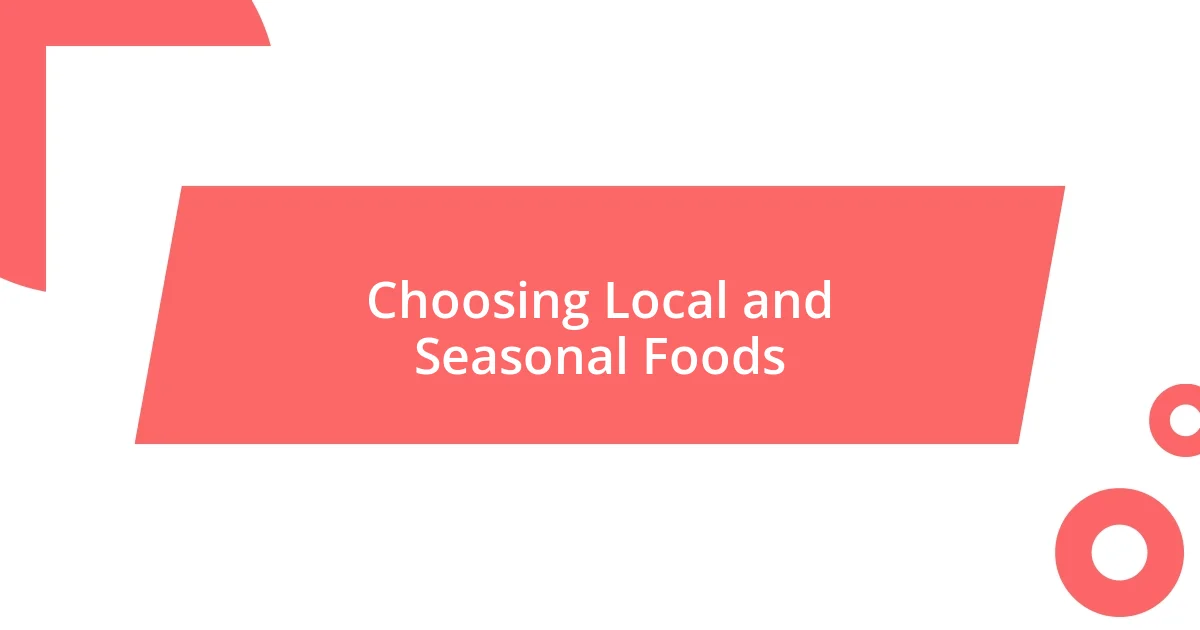
Choosing Local and Seasonal Foods
Choosing local and seasonal foods has become a fundamental part of my approach to eating ethically. When I buy from nearby farms, I not only enjoy fresher flavors, but I also support local economies. It’s that feeling of satisfaction that comes from knowing my food hasn’t traveled hundreds of miles to reach my plate. One time, during a community harvest festival, I tasted tomatoes straight from the vine. Now, every time I enjoy a tomato salad, I picture that vibrant farm and the joy of working alongside the farmers.
Seasonal foods bring their own set of unique benefits. From my experience, there’s something special about eating foods that are in their prime season. I remember savoring a particularly sweet peach last summer that was only available for a brief window. The memories of that flavor linger, reminding me of the connection to the land and the cycles of nature. Consuming seasonal produce encourages me to be more mindful of what I eat. It creates a rhythm to my meals that celebrates the abundance and diversity our Earth provides at different times of the year.
Moreover, choosing local and seasonal foods encourages a closer relationship between us and the environment. I often think about the environmental impact of long transportation routes for out-of-season produce. Just a few weeks ago, I visited a farmer’s market and struck up a conversation with a vendor who spoke passionately about the benefits of eating with the seasons. It inspired me to integrate more local ingredients into my cooking, fostering a connection with my community while being more conscious of my ecological footprint.
| Benefits of Local Foods | Benefits of Seasonal Foods |
|---|---|
| Supports local economies | Freshness and flavor |
| Reduces carbon footprint | Encourages mindful eating habits |
| Promotes community connections | Variety throughout the year |
| Enhances food quality | Ideal nutrition and health |
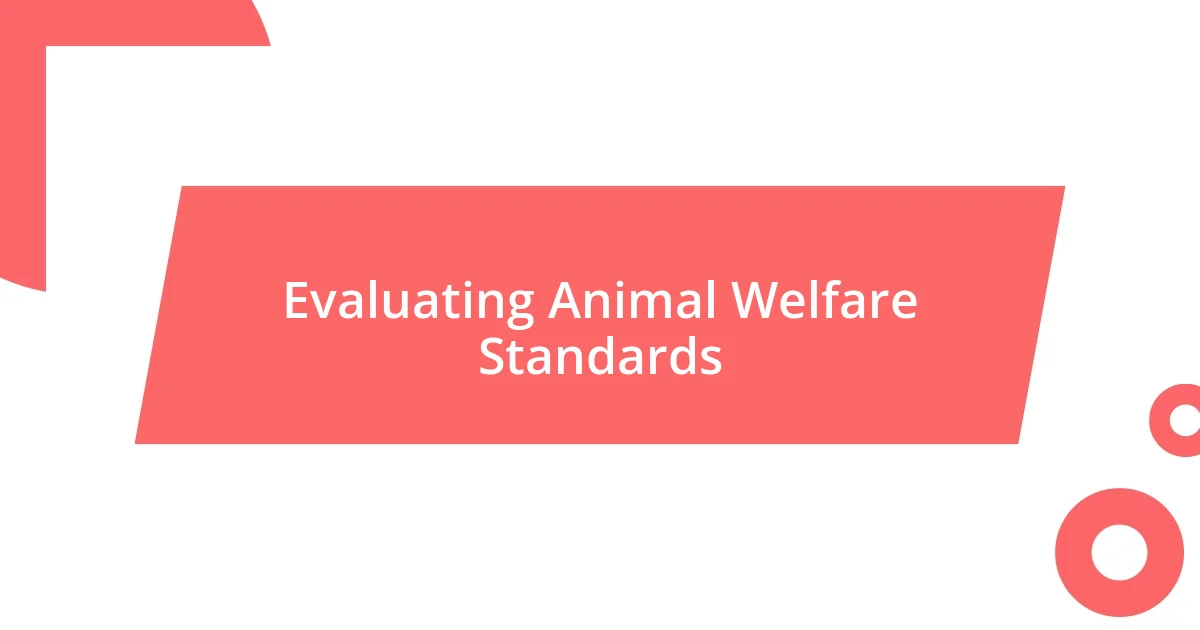
Evaluating Animal Welfare Standards
Evaluating animal welfare standards is essential for anyone passionate about ethical food sources. I often find myself thinking about the conditions in which animals are raised. For instance, I remember visiting a small farm where I was able to see pigs roaming freely outdoors. It struck me then how much happier they seemed compared to what I had previously imagined about factory farm conditions. What if all animals could have such freedom?
In my experience, the organizations that set animal welfare standards vary widely in their approach. Some focus strictly on space per animal, while others consider the entire living environment and treatment protocols. During a recent conversation with a farmer dedicated to ethical practices, I learned about the rigorous certifications they pursued to ensure their animals were treated well. Hearing about the steps they take to prioritize animal happiness opened my eyes to the depth of commitment required to raise animals ethically.
I find that certifications like “Pasture-Raised” or “Animal Welfare Approved” can guide my choices, but it’s also about the stories behind the labels. When I buy eggs from a farm that values transparency, I feel I’m part of a larger movement advocating for better animal treatment. Those little labels tell powerful stories about the lives of animals and the people who care for them, reinforcing my belief that food choices deeply impact not just our health, but the well-being of living beings.
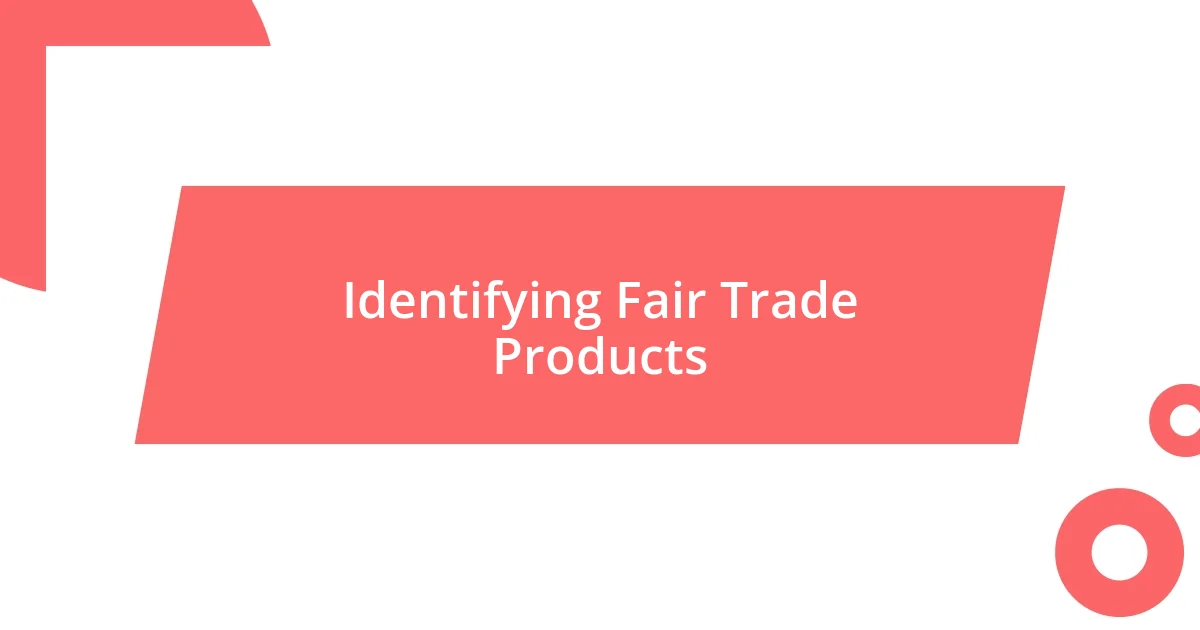
Identifying Fair Trade Products
Identifying fair trade products takes a blend of awareness and curiosity. I remember my first experience purchasing coffee marked with a fair trade label. The moment I enjoyed that rich brew, I thought about the farmers being paid fairly for their hard work. This connection between my cup and the sourcing made the experience feel so much more meaningful.
To spot fair trade products, I look for specific certifications like the Fair Trade Certified logo. I’ve learned that these certifications ensure certain standards are met in terms of fair pricing, safe working conditions, and community development. It’s a little moment of empowerment when I find that icon on a product. I feel like my purchase is part of a larger movement supporting ethical practices worldwide.
Another aspect I pay attention to is the story behind the products. I once read about a fair trade chocolate company that invests in local schools and health care in the regions where their cocoa is grown. I found myself gravitating toward their bars not only for their delicious flavor but also because each bite represents a commitment to improving lives in those communities. This kind of knowledge enriches my choices, reminding me that food has the power to make a difference.

Incorporating Plant-Based Options
Incorporating plant-based options into my diet has opened up a whole new world of flavors and benefits. I still remember the first time I tried a delicious black bean burger at a local café. It was so satisfying that I found myself questioning why I hadn’t explored meat alternatives sooner. Isn’t it fascinating how shifting just a few meals can not only enhance our health but also reduce our environmental footprint?
I’ve noticed that integrating plant-based foods doesn’t have to be an all-or-nothing approach. For instance, as someone who loves cooking, I enjoy experimenting with “Meatless Mondays.” This small change not only diversifies my meals but often leads to discovering delightful new recipes. I still smile recalling the rich, hearty lentil stew I made one evening; it was wholesome and comforting, proving that plant-based meals can truly satisfy even the heartiest appetites.
Moreover, there’s something quite refreshing about visiting a farmers’ market and seeing the vibrant array of vegetables and fruits. The colors and textures bring a certain joy that’s hard to match. I often find myself chatting with the vendors about their farming practices, which reinforces my connection to the food I consume. Have you ever noticed how much more exciting a meal feels when you know where the ingredients came from? That simple knowledge enriches my eating experience and makes each bite feel purposeful.
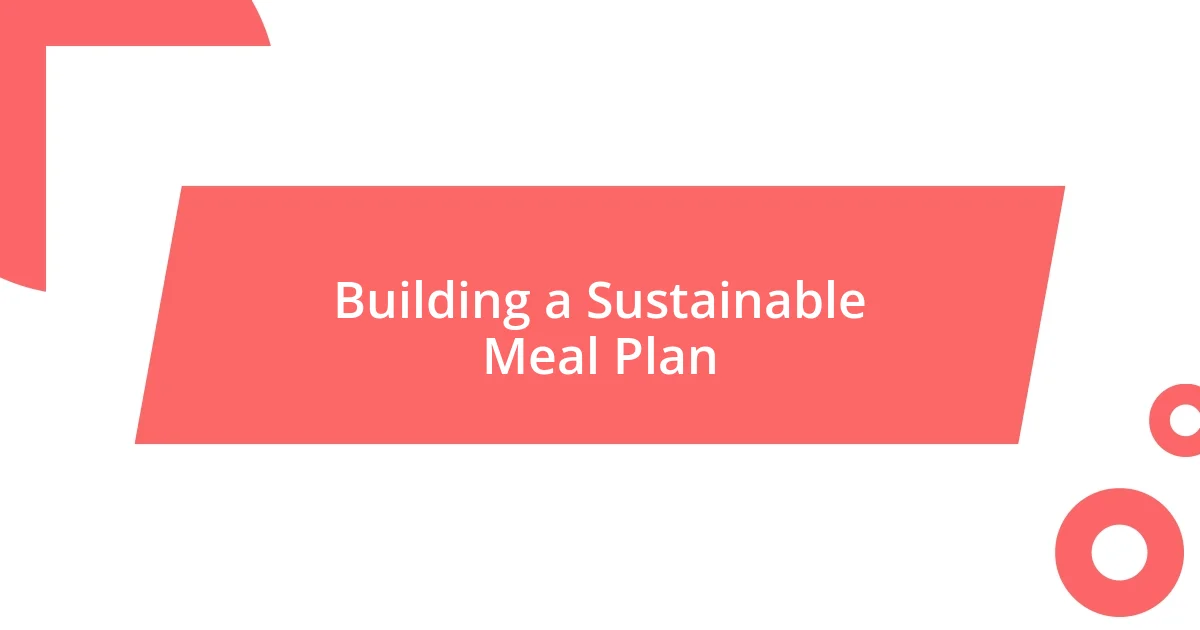
Building a Sustainable Meal Plan
Building a sustainable meal plan is an enriching journey that encourages thoughtful choices. I’ll never forget when I started mapping out my weekly meals. At first, it seemed daunting, but I soon realized how planning ahead allowed me to make more intentional decisions about what I was buying and eating. Have you ever thought about how much time—and waste—you might save by simply listing your meals? That awareness became one of my favorite parts of the process.
As I developed my meal plan, I focused on seasonal ingredients. It was such a revelation to learn how much flavor and nutrition local produce offers compared to off-season imports. I once came across a recipe for roasted root vegetables that called for carrots and potatoes harvested in my area. Preparing that dish was not only delicious, but it also felt good knowing I was supporting local farmers and minimizing my carbon footprint. Have you ever tried cooking with what’s in season? It can truly elevate your meals.
I also prioritized batch cooking, which has transformed how I approach weeknights. Instead of scrambling for dinner each evening, I dedicate some time over the weekend to prepare larger portions. I vividly remember the relief I felt when I opened my fridge and saw containers filled with hearty quinoa salad and homemade vegetable soup ready to go. It alleviated not just my daily stress but also sparked a sense of accomplishment. Doesn’t it feel great to have a plan in place that caters to your health and the planet? To me, that’s the essence of a sustainable meal plan—it’s about creating harmony between nourishment, enjoyment, and ethical choices.










